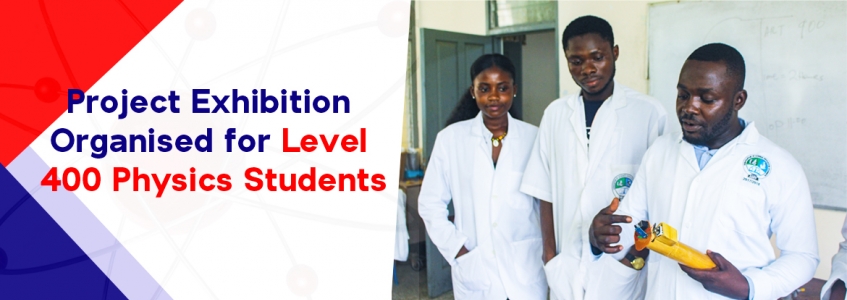Project Exhibition Organised for Level 400 Physics Students
A project exhibition has been organised for level 400 elective physics students at the Department of Physics Education Laboratory Two (2) at the South Campus of the University of Education, Winneba (UEW), on Tuesday, 14th September, 2021.
The one-day event saw the Department’s young enthusiastic final year students exhibiting science projects they had worked on during their course of study.
The exhibits by different student caucuses on various topics related to energy and innovations in Electronics and application in communication, environment, agriculture, water management and others were indeed eye-openers.
 Students during a hands-on activity at the exhibition
Students during a hands-on activity at the exhibition
Notable amongst them were the “Visually-Impaired Stick” that applied infrared sensors to buzz after detecting nearby objects in the pathway of a visually-impaired person; the “Automatic Turn-off Switch of Water Pump” that employed a relay coil driven transistor to solve the challenges of water wastage in homes and workplaces; and the “Smart Dustbin Management System” that was also designed with an ultrasonic sensor, ATMega 328P microcontroller to keep the environment clean especially in this era of the COVID-19 pandemic.
With an endeavour to promote a scientific attitude among the Department’s promising young students, especially females, the exhibition was one of a kind.
 A student displaying how the visually-impaired stick uses infrared sensors to detect objects that are close by
A student displaying how the visually-impaired stick uses infrared sensors to detect objects that are close by
The aforementioned projects were supervised by Prof. Victor Antwi, Prof. M.K. Amedeker, Prof. K. D. Taale, Dr. I. K. Anderson, Mr. Fortune Addo-Wuver, Dr. Desmond Appiah, Dr. Michael Gyan, Mr. Emmanuel A. Ahenfo, Ms. Cynthia Jebuni-Adanu, Mr. Isaac K. Acquah, Mr. Anthony B. Yuoni, and Mr. Issahaku S. Jakalia.
Assistant Lecturer for the electronics course, Ms. Cynthia Jebuni-Adanu, in an interview, revealed that Lecturers in the Department have satisfactorily trained the final year students who are teacher trainees to go and teach in High Schools.
 Ms. Cynthia Jebuni-Adanu explaining the importance of developing electronics and hands-on practicals in the development of a country
Ms. Cynthia Jebuni-Adanu explaining the importance of developing electronics and hands-on practicals in the development of a country
“We believe that as a country, we will be able to develop when we have electronics as one of our major courses that is well taught. We are training these students to go and do hands-on activities. We believe that you cannot just describe how a child should ride a bicycle by just observing but the child should be able to see and practice. So, this is a course that we are not just saying that just learn about diodes and transistors and go home but how do you use these components to give simple activities and solve problems in the society?
“Therefore, the students came out with different solutions to existing problems like the Visually-Impaired Stick, the Automatic Turn-off Switch of Water Pump among others. These are equipment that our students have invented and we are just encouraging them to give these simple hands-on activities to the students. These could be exhibited during speech days and other important occasions,” she stated.
Ms. Cynthia Jebuni-Adanu expressed hope in having a better fun fair where better handouts would be produced, and then handed over to the society so they could see the contributions of the Department in nation building, in the next and ensuing years.
 The final year students with their lecturers in a group pose after the exhibition
The final year students with their lecturers in a group pose after the exhibition
“The Department affirms that the scientific research outcomes of our University are closely linked and related to the problems and challenges faced in our country and can ultimately serve as a guide to high scientific research levels,” she asserted.
A student, Ms. Sandra Ampomah attested to the ingenuity the course has brought to her life and field of study. “This course has really helped me to actualise so many ideas. It has helped me to know some components that we use to manufacture electrical appliances for our homes. Now, I know what transistors are, diodes, so many things and how to combine these to invent something.”
Another student, Mr. Maxwell Obeng pointed out the essence of the course for the environment. “With the help of this course, we’ve been able to manufacture a prototype of many other things that are more helpful in our society.”



